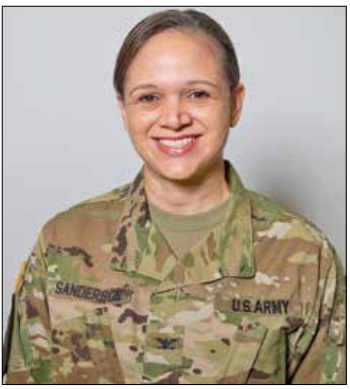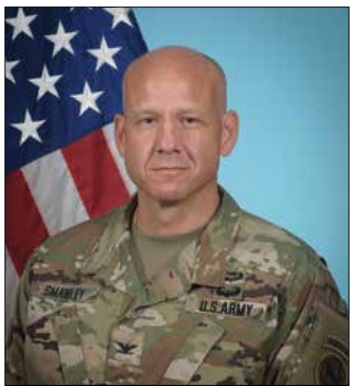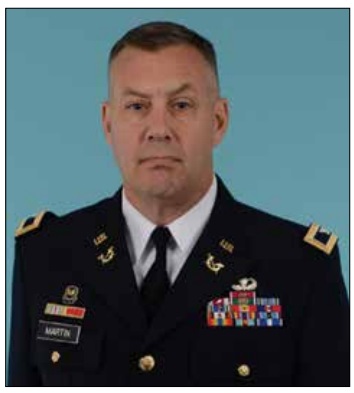Why They Stay
By Colonel Fansu Ku
I stayed because I realized that leadership . . . is about his heart and his commitment to his fellow man. It’s about developing the hand that you are dealt. It’s about giving back to society a better citizen than society gave to you when that soldier enlisted in the military. It doesn’t matter if a soldier stays for three years or thirty. If he leaves the military feeling a little bit better about his fellow man; if he begins to question some of the prejudices that he grew up with; if he feels moved when he hears the national anthem being played and stands a little straighter, then staying in the military is worth all of the pain and sweat and hardship.
- MG (Ret.) Lloyd Miles
In a paper entitled “Why I Stayed,” then-Colonel Lloyd Miles—who retired in 2012 after more than thirty-two years of service—attempted to answer a question that was posed to him by friends and families on many occasions. This same question was posed to many of us in the Corps over the last couple of years. Recently, I interviewed three senior leaders with diverse backgrounds, asking them their reasons for joining the Judge Advocate General’s Corps (JAG Corps), but more importantly, why they stayed. Three main themes run through each of their reasons.
First, good leaders make a remarkable difference in whether someone stays or leaves. As aptly pointed out by a professor while I was pursuing my Masters in Law (LL.M), we all have three basic questions in our minds about our leaders, whether we say it out loud or not: Can I trust you? Do you have my back? Are you committed to be your best every day? If the answer to all three is yes, the chance that the leader will inspire someone to stay increases, perhaps for no other reason than an opportunity to continue working for that leader.
Second, diverse work opportunities, even in far flung places, and institutional relevance inspire people to stay. People relish the opportunity to do interesting things that matter, and they want to contribute their share to the greater good. You have to know yourself and how you are “wired.”
Third, the people. Perhaps it is cliché because you hear it at every single promotion and retirement ceremony, but it is true: people make the difference. I personally look forward to, but also dread, moving and changing assignments every couple of years. Building a new life for yourself in a new environment never gets any easier. I got through it because of the people who showed up to greet me each time. Throughout the years, these people inspired and pushed me to be better. I have learned, just as each of the three leaders I spoke with has learned, that each assignment may not be what I had imagined for myself, but it was a journey worth taking. As I have progressed in the Corps, I have developed lifelong friendships—a community of people who have become my family. You have a JAG family too—a family that will pause and reflect with you about who you want to be and the impact you want to have. I encourage you to pause and reflect on why you stay.
Below is what I learned from three leaders on their reasons for remaining in the JAG Corps.

Colonel Stephanie Sanderson
There are moments in our lives and careers when we should pause and reflect, not only about who we want to be and what kind of impact we want to have, but what this will take. It is through this process that you can become the leader that you’d choose to follow.
- Mike Hochleutner, Director, Stanford MSx Program
I have known Colonel (COL) Stephanie Sanderson for over seventeen years, ever since we were both assigned to Defense Appellate Division as second-term captains, two months before 9/11 forever changed how we viewed the world.
Colonel Sanderson initially joined the Corps because growing up in rural Alabama she always felt there was a world to see beyond Alabama. Her father, who retired from the Army in 1974 as a First Sergeant, did not want his daughter—who had received full scholarships through college and law school—to join the Army. In his mind, the Army was for people who did not have other opportunities, and he felt she could have done anything with her education. Within a week, however, he was the proud father of a daughter who was an officer in the JAG Corps.
She stayed because of role models and mentors such as Major General (MG) (Ret.) Ken Gray, MG (Ret.) Butch Tate, COL (Ret.) Richard Cairns, COL (Ret.) Jerry Linn, and COL (Ret.) Stephanie Stephens, just to name a few.
She stayed because of the positive professional experiences during her internship and initial assignment at Fort Benning, and all of her assignments since.
She stayed because the JAG Corps was, and continues to be, her opportunity to practice law and do something bigger than herself.
She stayed because she loved moot court during law school and early in her career the JAG Corps offered her the opportunity to do appellate work in the National Capital Region (NCR). As a small-town girl, she was excited to do what she loved in the NCR.
She stayed because, as one senior leader astutely pointed out, the Corps drives you forward in twenty-four-month increments with schools, jobs, and opportunities that are difficult to turn down.
She stayed because with each opportunity that the JAG Corps put before her, she thought, “Well, this last job went well, so why not?”
She stayed because the JAG Corps offered her opportunities to go overseas to soldier, lead, and lawyer.
She stayed because places like Korea, Iraq, and Germany offered her unparalleled opportunities to travel and see a world beyond Alabama.
She stayed because up until the graduate course, she looked for assignments that would set her up for a post-JAG Corps life. But every twenty-four months, the JAG Corps offered her opportunities to live and work in places she never would have seen, along with friendships she never would have developed but for the Army.
She stayed after the graduate course because of the leadership and the people—you have a family everywhere you go.
She stayed because as she became more senior, she saw how the Corps operates at the institutional level and her ability to make a difference as a partner in this institution.
In the end, she stayed for over twenty years and continues to stay today because helping others has always been important to her, and is a big part of who she is. She became a lawyer to help others—to help the Boo Radleys in the world; To Kill A Mockingbird is one of her favorite books. Staying in the JAG Corps gave her a platform to serve globally, not just locally, and the opportunity to make a difference.

Colonel George Smawley
Throughout the varied positions he held during his more than twenty years of military service,[Brigadier General Wayne E.] Alley remains upbeat about nearly all of them because the overarching institution itself afforded him so much satisfaction. Certainly, he could have done other things; ability was never an issue. What sustained him was the same thing that brought him back into the Army in the first place: an emphasis on the Army’s advantages over its disadvantages. The Army’s variety of rich experiences and the company of superior people still won out over average pay, constant moves, and the risks inherent in combat service.
- Colonel George Smawley, Staff Judge Advocate, U.S. Army, Pacific
Describing the life of one of the U.S. Army JAG Corps’ most preeminent jurists, COL George Smawley echoes several themes present in his own twenty-seven-plus year Army career: the ebb and flow of working for great leaders, the opportunity to be part of an institution that is not profit-driven, and the occupational benefit of doing exciting and diverse legal work. Along with Brigadier General (Ret.) Alley, COL Smawley has studied, observed, and often written about the commitment to service of other pioneering JAG Corps leaders. In turn, he encourages those he works with to trust and develop their own narrative in the JAG Corps.
The Army was not COL Smawley’s first brush with military service. He grew up with a father who fought in North Africa and was stationed in Korea and Japan. He was twelve years-old before he went to a civilian supermarket. Moreover, with a mother and sister born and raised outside the United States, he grew up in a house with a real appreciation that the world was bigger than his physical presence.
At seventeen, he enlisted in the Air Force National Guard and drilled through college as a C130 radio operator. When he ran out of money in his sophomore year, he won an Army ROTC scholarship, branch transferred, and later joined the JAG Corps.
He stayed at first because the Army and the Corps’ structure motivated and inspired him in twenty-four-month increments with jobs, schools, and opportunities.
He stayed because as a captain he was introduced to the soldiering aspect of the Army and met thoughtful and intelligent leaders who took an interest in him. They made him comfortable with the idea of the Army as a lifetime career.
When 9/11 happened, he witnessed how the Army, as an institution, responded to real world events. Though he did not join the Army with a great rush of patriotism like many others, after 9/11 he felt he became part of the institutional Army, and recommitted to serving.
He stayed because of the continued opportunities to soldier, lead, and respond to real world problems in diverse places.
He stayed because he always felt the legal work he did mattered.
He stayed because he knew he was not wired to work in a professional environment driven by profit and lacking in diverse work opportunities.
He stayed because he loves to travel and the Army took him to eighteen different countries.
He continues to stay today because the reasons he stayed as a second term captain are no different for him now as a senior colonel—great leaders, exciting legal work, amazing people, and institutional relevance.

Colonel Rick Martin
I had the privilege of working for COL Rick Martin, Chief, Professional Responsibility Branch, when he served as the U.S. Army Pacific Staff Judge Advocate. He shared with me—as he did with many others he worked with—MG (Ret.) Miles’ article to encourage us to reflect on whether we are right for the Army and whether the Army is right for us. Understanding why senior leaders like him stay challenged me to think through why I am in it every day. I challenge you to do the same.
He stayed because he is a son of the American Revolution who had many ancestors serve throughout the history of our nation, to include paying the ultimate sacrifice, and service is an important part of his family.
He stayed because he didn’t want to be a lawyer who sits behind a desk.
He stayed because his clients all took the same oath to support and defend the Constitution of the United States against all enemies, foreign and domestic; that they will bear true faith and allegiance to the same; that they took this obligation freely, without any mental reservation or purpose of evasion; and that they will well and faithfully discharge the duties of the office on which they are about to enter.
He stayed because he knew why he went to work every day.
He stayed because the Corps allowed him to learn and do different things in far flung places he would not otherwise have seen, and his family got to accompany him on this journey.
He stayed because when he became a field-grade officer, he was entrusted to build, mentor, and develop the next generation of leaders.
He stayed because he gets to create conditions for those coming up behind him to succeed.
He stayed because he believes the work he is doing is important work for the Army and the JAG Corps. It’s about giving back to the organization and doing right by the Army.
He stayed because he has faith in the system and that on balance, we get it right.
He stayed because he understands that at times, he may need to go do something he would rather not do so others can also grow and have their opportunities.
He stayed because he can still contribute to the cause. He firmly believes that while we all have to leave at some point, you have to be sure you are leaving for the right reasons.
He stayed because despite the bureaucracy and the frustrations, he believes in the mission and in taking care of the people the Corps entrusted him to lead.
He stayed because he has met so many truly good, professional people throughout the Army at every duty location. And had the good fortune to work for inspiring leaders.
He stayed because he just thoroughly enjoyed his time in the Army. If you are not having fun, why stay?
He stayed because he knew what he was doing was far better than anything outside the JAG Corps. He believes in the mission and the people.
He stayed because when he wrote “needs of the Army and the JAG Corps” on his assignment preference worksheet, and on more than one occasion he was genuinely humbled by what the Corps entrusted him to do.
He stayed because of the people. At the end of the day, it’s always the people.
Why do you stay and what are you in it for? TAL
COL Ku is a Military Judge for the Second Judicial Circuit at Fort Bragg, North Carolina.